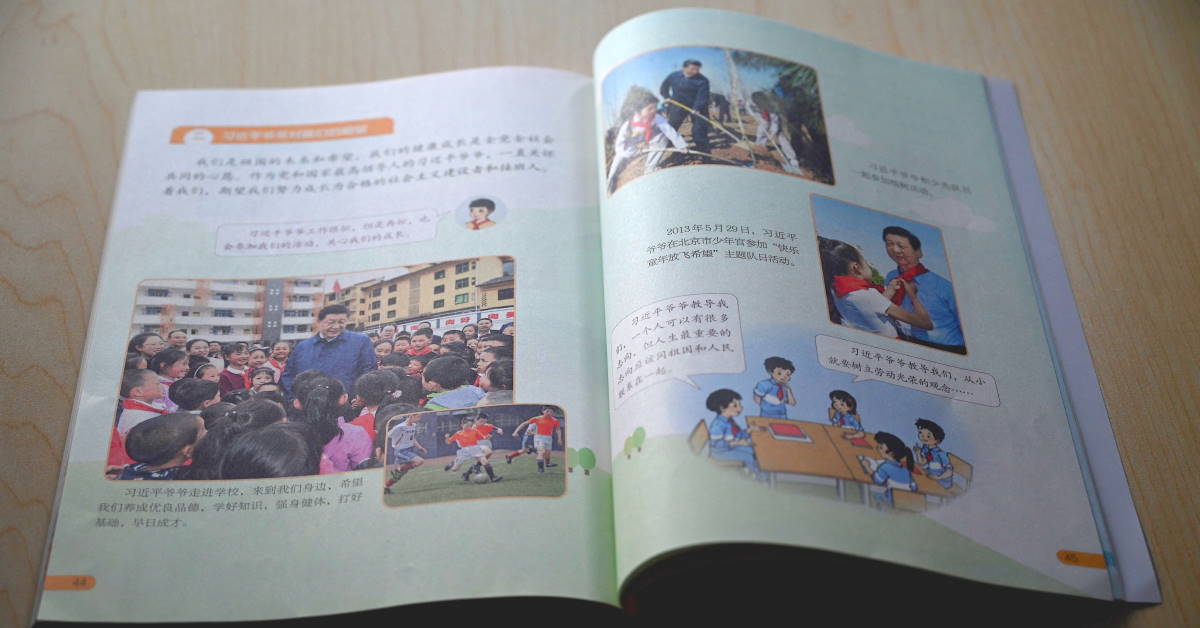Chinese pupils returned to school Wednesday with new textbooks peppered with "Xi Jinping thought", as the Communist Party aims to extend his personality cult to children as young as seven and rear a new generation of patriots.
The education ministry has said it will incorporate Xi's vaguely defined political ideology into the national curriculum, from primary schools to graduate programmes, at the start of the new school year on Wednesday.
Primary school teachers must "plant the seeds of loving the party, the country and socialism in young hearts", according to a government notice on the new curriculum.
The new school books are decorated with the president's pithy quotes and images of his smiling face, with elementary school students served up chapters on the achievements of Chinese civilisation and the Communist Party's role in poverty alleviation and fighting the COVID-19 pandemic.
Lessons are interspersed with quotes from Xi on patriotism and duty, as well as anecdotes of his meetings with ordinary citizens.
"Grandpa Xi Jinping is very busy with work, but no matter how busy he is, he still joins our activities and cares about our growth," one textbook says.
Xi's thought encompasses 14 principles including "absolute Party leadership" over the military and "improving living standards through development".
It was enshrined in the constitution during a 2018 legislative meeting that abolished term limits and paved the way for him to rule indefinitely.
The principles are now cited regularly by officials in wildly varying contexts from fighting COVID-19 to literature and art, and universities have opened institutes dedicated to Xi's thought.
Subtle Pushback
The push to indoctrinate children with his political thinking brings Xi's ideology to its youngest audience yet.
It comes as the Party conducts a wider campaign to fight what it considers corrupting influences on the youth, from video games to celebrities and foreign educational tools.
Textbooks for older children delve into more complex topics such as the country's aerospace industry and the path to becoming a "modern socialist great power".
Several parents privately expressed discomfort about the curriculum but declined to be interviewed, fearing they would get in trouble for speaking to foreign media.
But the policy has been met with subtle pushback by anonymous internet commenters.
"Brainwashing starts from childhood," one user of the Weibo social media platform wrote.
"Can we refuse this?" asked another.
Wang Fei-Ling, a professor of international affairs at Georgia Tech, said the textbooks were an example of the Communist Party's effort to "bet on a cult of personality in a Mao-like strong leader."
"However, given what has happened in the Chinese society over the past four decades, I think many parents may not like it very much and many students may find it boring – but few would or could protest it publicly," Wang added.
"Most are likely to simply not take it very seriously."
While China has long given schoolchildren patriotism and political education, the new curriculum is "about promoting the cult of Xi as much as about instilling a greater sense of nationalism," China researcher Adam Ni said.
Envoy Makes Unannounced Myanmar Visit
Meanwhile, China's special envoy for Asian affairs has wrapped an unannounced, week-long visit to Myanmar that included discussions with its junta leader on the country's political future, Beijing said Tuesday.
Myanmar has been in political chaos since the military ousted Aung San Suu Kyi's government in February, launching a bloody crackdown on dissent.
International efforts to stem the violence have failed to yield results, with the European Union (EU) accusing junta allies Russia and China of blocking efforts at the United Nations (UN) Security Council to impose an arms embargo.
Special envoy Sun Guoxiang met junta leader Min Aung Hlaing and "exchanged views... on the political landscape in Myanmar," according to a statement released by Beijing's embassy in Myanmar.
China supports "Myanmar's efforts to restore social stability and resume democratic transformation at an early date," it said.
The statement on Sun's 21-28 August visit did not mention any meeting with the shadow government of lawmakers from Suu Kyi's ousted party, who insist they are Myanmar's legitimate authority.
Beijing enjoys exceptional leverage over Myanmar, and has so far refused to label the military action a coup.
Sun played a role in previous peace talks between Myanmar's military and myriad ethnic groups – some of whom Beijing maintains alliances with, analysts say.
Myanmar is also a vital piece of Beijing's huge Belt and Road infrastructure initiative.
Last year, Chinese President Xi Jinping visited the country and promised to support the Myanmar government on a development path "suited to its own national conditions".
Chinese state media on Tuesday reported the successful completion of a test journey carrying cargo along a new sea-road-rail passage linking southwest China to the Indian Ocean through Myanmar. – AFP
